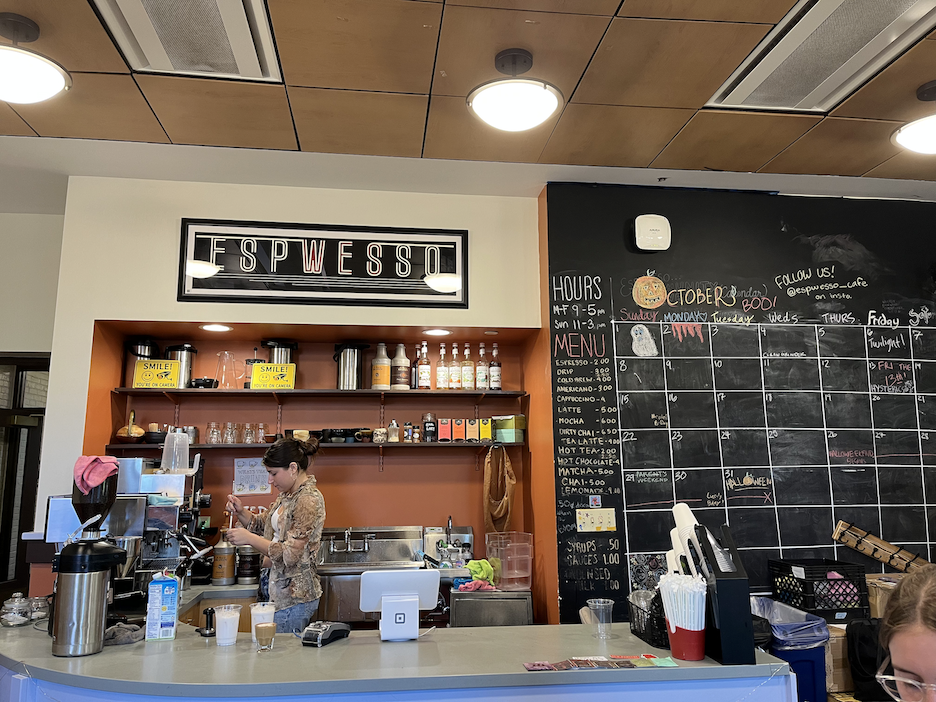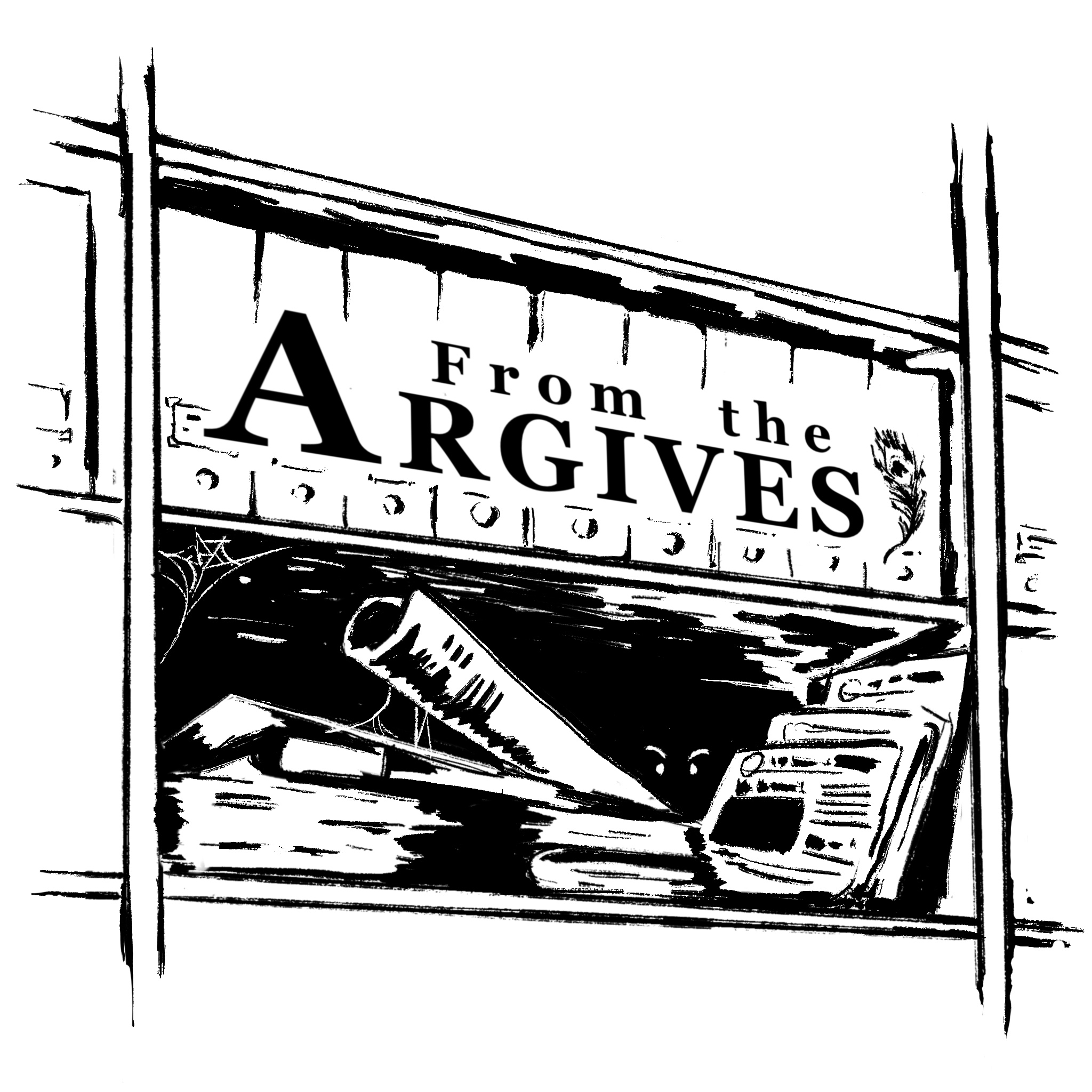
Espwesso, a student-run café in the basement of Albritton, is a hidden gem at the University. Even though students frequently mumble the name, it’s not because they’re trying to keep the spot a secret, but rather because Espwesso can feel awkward to pronounce. Whisper it to yourself, you’ll see….
The name, just like the café itself, was created by students for students. In 2010, the student body suggested the name on an Anonymous Confession Board thread, which was then officially chosen through a write-in vote administered by the Wesleyan Student Assembly (WSA).
This spirit of collaboration, one that generations of students have continually maintained, drove the initial effort to get the café up and running. Micah Feiring ’11, a member of the Student Affairs Committee of the WSA at the time, originally pioneered the idea for a new social space on campus.
Feiring drummed up support for his student-run café project with an article in The Argus, receiving enthusiastic responses from two students who would eventually become his co-founders: Alex Bernson ’11 and Sophia Levan ’12. Bernson and Levan felt compelled to join Feiring because of their shared love for coffee and coffee-making.
“I had been a big coffee dork for a while at this point,” Bernson said in a 2019 Argus article entitled “Espwesso Baristas Talk Past, Present, and Future of Student-Run Café.” “I was dedicating a lot of my life to it, so I spent a little over a year in Portland, honing my craft there, and then came to Wesleyan. So I was coming in looking to do coffee stuff with my life.”
Feiring believed that such a small, intimate space would be well-suited to celebrate students’ creativity, which could mean anything from displaying student artwork on the walls to holding poetry readings and open mics. In a 2010 article entitled “Student-Run Café Planned To Open in Albritton,” Feiring also emphasizes his vision for the café to be a quiet and relaxed workspace.
“Most nights will be devoted to a low-key environment where students can work or congregate for quiet conversation,” Feiring said.
The café doesn’t just feature art and community. Since its inception, Espwesso has spearheaded many sustainability efforts on campus. These initiatives have included discounted reusable to-go mugs, not serving whole milk, and relying on local vendors.
“It really promotes you sitting there and just being there,” current Espwesso manager Cypress Hubbard-Salk ’24 said. “All the mugs that are created are from the Wesleyan Clay Club. All the espresso grounds are fully composted.”
Espwesso barista Luci Paczkowski ’24 explained how this original mission has come to fruition. The eclectic space, which feels warm and welcoming, has a homemade feel with flyers hanging from the walls, colorful writing on large chalkboards, and newspaper cut-outs embedded in the tables.
“[Espwesso] still has the same tenets of student-run, quality coffee, personal service, community, and [being] eco-friendly,” Paczkowski said.
Nevertheless, the current staff at Espwesso acknowledges the café has had its share of ups and downs over the years.
“It’s a tricky thing, having a student-run business in a Wesleyan space,” Espwesso barista Dylan Ng ’24 said. “It’s a weird relationship. Wesleyan owns this room, so [help with] supporting the physical space would be nice. Right now, we have a lot of work order stuff that we’ve been doing just because [the equipment] hasn’t been used in like five months.”
Paczkowski expanded on both the challenges that Espwesso’s relationship with the University has caused and the potential that it provides.
“If [the University] could give equal attention to growing Espwesso and [an] interest in supporting the student workers, that would go a long way to making this space more communal,” Paczkowski said.
Espwesso faces additional challenges as a student-run business: it can often be difficult to pass on operational knowledge and ensure the café’s longevity, with management changing every year or two as students graduate and move on. Even in Espwesso’s early days, the founders expressed concern about how to secure the café’s legacy, grappling with the question of how knowledge would be passed down to future students.
“Creating institutional memory is incredibly complicated in a student-run business,” Levan explained in the 2019 article.
Efforts to increase institutional memory are embedded even in the furniture. The iconic funky tables don’t simply instill the space with a sense of creativity but also preserve the history of the establishment.
“If you read the letters on the stools, you’ll see how history is ingrained within the space,” Hubbard-Salk said.
Besides the run-of-the-mill challenges associated with a student-run café, in the early spring of 2020, the café faced a series of major hurdles. First, an 18-day closure and over $9,000 in renovations were needed to bring Espwesso up to code. Then, hardly a month later, the café faced indefinite closure due to the COVID-19 pandemic. Again, the café weathered the storm, opening its doors in the Spring 2021 despite stringent regulations preventing it from serving anything but drip coffee.
Hubbard-Salk became involved with the café in 2021 and remembers Espwesso as a barren landscape with very few customers. Pandemic-mandated distance and separation threatened the café’s founding dream of providing space for art and community.
“During Covid, I remember [there] would be one depressing person sitting behind the counter,” Hubbard-Salk said. “I really liked the space though. Also, it was pretty diverse. I remember this one girl—she worked here—and I kind of knew her through some of the [Resident Advisor (RA) and] Black people circles on campus. I was like, ‘Okay, cool people work here.’ And that made me feel comfortable to work here.”
For Hubbard-Salk, this impression cemented her interest in continuing the legacy of a safe, independently operating student-run café that provided a space for marginalized students to gather and share art over a cup of coffee.
“I want to bring Espwesso back to a very community-centered space,” Hubbard-Salk said. “Especially, a space for people who don’t really have other spaces on campus. It started as this kind of queer space. Even though I’m not queer, I do identify with feeling like you don’t have spaces at Wesleyan. So, making sure that other [communities] on campus know that they can use this place for events is really important to me. And having events that are not just full of cis, het[erosexual], white men, or white people on this campus is really important to me. I made sure to have a diverse staff this year.”
Even though Espwesso struggled to regain consistency and retain staff and customers after the pandemic, the new management has made an impressive comeback.
“You could kind of tell last year no one was really in here,” Ng said. “It was always empty, and they weren’t advertising a lot.”
However, with new leadership, Espwesso is turning over a new leaf.
“I think it’s a lot better this year,” Ng said. “The vibe in here has changed for the better. There’s always people in here now. It’s getting more crowded these days [which is an] issue, but usually you can get a table and sit for a few hours. It’s really exciting. A lot of people are coming, which means we’re able to generate more money.”
Hubbard-Salk described exciting events she has planned for the staff in the coming months.
“The team is going to do a latte art class, hopefully in November,” Hubbard-Salk said. “I want everyone that I’ve employed to be able to find a job as a barista when they leave, and you kind of need to know how to do that, or to have tried before.”
With a bright future ahead, this student-run business is a unique hub unlike anywhere else on campus. Emerging out of the post-pandemic times, students agree that they want the space to become more than just a coffee shop.
“I want Espwesso to be half student space and half café,” Paczkowski said. “Right now, we’re running a pretty successful café that has the potential to be a more open student space. I think that’s going to grow by either receiving university support or the people that are working at Espwesso now putting effort into cultivating different events and making sure that this space is open to everybody and not just like a specific group of people.”
Long-term success in a space that is exclusively run by students and has a high turnover rate depends on collective commitment. Espwesso’s baristas stressed the need for collaboration, team effort, and united organization.
“Because it’s a student-run, I think it’s more of a communal team effort to keep the place running and to uphold these standards,” Paczkowski said. “Because it’s just such a small group of us, it’s on us to equally care for the space. Cypress and Sophia [Chen ’25] have done a really good job of ensuring that this is a team effort, and we’re all here because we care about coffee and care about each other.”
In the future, Espwesso is looking to host more events, whether that is open mic nights, release parties, or whatever you have in mind. You can reach out to Events Organizer Nicole Allina ’24 for more details!
Eugenia Shakhnovskaya can be reached at eshakhnovskaya@wesleyan.edu.
Ella Henn can be reached at ehenn@wesleyan.edu.
Abby Glassman can be reached at aglassman@wesleyan.edu.

“From the Argives” is a column that explores The Argus’ archives (Argives) and any interesting, topical, poignant, or comical stories that have been published in the past. Given The Argus’ long history on campus and the ever-shifting viewpoints of its student body, the material, subject matter, and perspectives expressed in the archived article may be insensitive or outdated, and do not reflect the views of any current member of The Argus. If you have any questions about the original article or its publication, please contact Head Archivist Sam Hilton at shilton@wesleyan.edu.


Leave a Reply